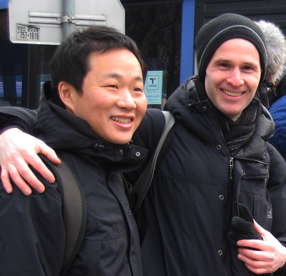 Jong Suk Lee
Jong Suk Lee
“Family” is the word that came to mind when I first met North Korean students at Hangyeore High School. This is the first time I had been so close to North Koreans in my life. They reminded me of my brother and sister — talking, eating, playing and laughing like my own family. In fact, we are one family that has been living in two different worlds, pointing guns at each other for nearly 60 years.
I was born and raised in Seoul, South Korea. Both of my parents were born on the north side of border but raised in the South. My grandparents were born and raised in the North but died in the South. The border established after the Korean War in 1953 separated ten million families. Many people have since passed away without having a chance to talk to their family members across the border. No wonder I felt the North Korean students were family, because, actually, any one of them could be one of my distant cousins.
The separation of families continues as North Korean defectors leave family and relatives behind to seek a better life in the South. Thus, this awful national tragedy of dispersed families continues to grow.
Nowadays, reunification is not a critical issue in South Korea. Most of the population born after the war does not have any relationship with the North. But every teacher and student in Hangyeore High School hopes and believes that the reunification of Korea will come sooner or later.
My uncle, who left his brother in the North, also believed that reunification would happen, until his death a couple of years ago. He was on the waiting list for the South/North Separated Family Reunion Meeting for a long time. He had lived his whole life with loss and regret over his brother. Before he died, he asked me to deliver a letter to his brother. I personally wish for the reunification of South and North Korea and an end to this national tragedy, regardless of whatever political or economic conditions reunification might bring. Then, I could deliver my uncle’s letter to his brother in person.
Micah Fink
It was a strange time to be in Seoul.
A few days before I arrived in early February 2009, North Korea unilaterally abandoned all peace agreements with the South and warned that growing tensions might lead to “uncontrollable and unavoidable military conflict and a war.” Over the next few weeks, the North Korean government began preparing to launch an intercontinental ballistic missile.
And yet almost no one I met in South Korea seemed particularly concerned.
Most of the people I encountered during my travels seemed utterly disinterested in what was widely dismissed as North Korean saber rattling.
Instead, what I did hear about, constantly, was the economy. South Korea has undergone an economic miracle of sorts over the last two generations — rising from the one of the world’s poorest countries to one of the wealthiest in just forty years. But that growth is dependent on global capital and global markets. And those markets are now in turmoil.
North Korea, it seems, is yesterday’s news here.
The reunification of Korea is further away today than it’s been for a generation — and outside of Hangyeore High School, few of the people I met seemed to mind.
“Reunification was very popular among young people about ten years ago,” one man in his mid-thirties told me, “but nobody is really interested in it now.” He then drew a parallel between the Koreas and Germany, remarking on how hard it had been for the West German economy to absorb the underdeveloped East after the fall of the Berlin Wall. This was a story I heard several times, with most people adding that the gap between North and South Korea is many times greater than what it was in Germany.
“Reunification,” another South Korean told me bluntly, “might just ruin our economy.”
